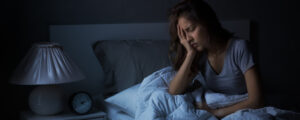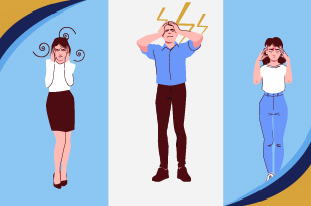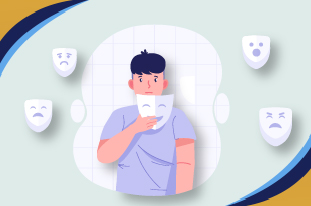Have you ever felt like your sleep is playing with you? Are you struggling with depression and are unaware of it? Depression and sleep are closely linked. Let’s see how?
Depression isn’t a “one-size-fits-all” experience.
Depression comes in many forms and features. But when the depression becomes persistent sadness, disappointment, and the feeling of hopelessness for over two weeks, it becomes a depressive disorder. This mainly leads to a sleep disorder.
It’s a complex thing to explain whether the sleep disorder brings depression or depression leads to insomnia.
This interconnection between sleep and depression is a critical area to explore.
As Dr. Matthew Walker explains in his book Why We Sleep, “The shorter your sleep, the shorter your life. The fewer the benefits of sleep, the greater the likelihood of developing a medical disease or a mental disorder.”
He also said, “The best bridge between despair and hope is a good night’s sleep.”
The understanding of this powerful link is not just academic; it’s naturally necessary for improved well-being and more effective management of depression.
You are not alone. Over 17 million adults are struggling with depression annually in the United States, as revealed by a statistic from the National Institute of Mental Health (NIMH).
Even more obvious or heartbreaking is that 2.3 million adolescents face this struggle. Tragically, suicide is the second leading cause of death among those aged between 10-34 years old.
The above aren’t just numbers; they represent massive lives that are deeply affected by depression, which highlights the need for understanding and support.
The Interconnectedness of Sleep and Depression
Poor sleep and depression are closely interlinked with a bidirectional relationship where each negatively impacts the other. The majority of people who are struggling with depression also report sleep disturbances, particularly insomnia.
Some sources suggest that doctors may find it difficult to diagnose depression without reports of sleep complaints.
This is because sleep issues can worsen existing depressive disorder symptoms like fatigue, irritability, and difficulty concentrating. Opposite to that, disordered sleep can increase a person’s vulnerability to developing depression, even years down the line.
Studies show that individuals with insomnia have a significantly higher risk of developing depression, and if sleep problems persist, the risk of depressive disorder remains even after it is treated.
The combination of sleep problems and depression can also make depressive episodes even more severe and long-lasting. Therefore, it is necessary to address those difficulties in both preventing and managing depression and sleeping.
Read More: Living Life with High-Functioning Depression (Dysthymia)
When The Sandman Sets Up Permanently
What is often overlooked yet profoundly intertwined with depression are sleep disturbances. What irritates you is that your body and mind desperately need rest, but you find yourself staring at the ceiling for hours and remain in that state throughout the night, and experience excessive daytime sleepiness, a tug toward inactivity that can feel equally devastating.
However, one more condition is there, and that’s hypersomnia. These are also more prevalent in persons with depressive disorder. Hypersomnia is characterized by sleeping too much and excessive daytime sleepiness. However, this condition is less common than insomnia in persons with depression, particularly in younger individuals and women.
The Tangle of Who Started It?
It is like a classic example of a chicken-or-egg scenario: does poor sleep invite depression, or does depression steal your peaceful sleep?
The truth is that they are often partners in crime. It is highlighted in the book “Why We Sleep,” by Matthew Walker, that shows an outstanding link. It shows that individuals who struggle with insomnia face a significantly higher risk, up to tenfold, of developing depression as compared to those who enjoy restful nights. On the other hand, 75% of those living with depression struggle with sleep. This isn’t a mere coincidence; it’s a deeply rooted biological relationship.
When our sleep becomes irregular, our emotional resilience can crumble. Daily stresses like financial worries or a bustling commute can heighten the nighttime awakening for someone who is struggling with depression. This is not a weakness; it is a physiological response. Understanding this connection is the first step towards reclaiming your nights and, in turn, your days.
With the recognition of these signs early, we can empower ourselves, seek the right support, and begin feeling healthy, well-rested, and ready to enjoy life actively.
Read More: Can Anxiety Cause Chest Pain and Shortness of Breath?

Depression and Sleep Treatment
Therapies
The good news is that when individuals need to treat major depression, a significant improvement often comes with their sleep pattern.
This is not a side effect; rather, it is a testament to the profound connection between our mental and physical well-being.
The first step always involves a thorough assessment by a doctor or mental health professionals like psychiatrists who understand the specific nature and intensity of the depression and trouble sleeping. This step further guides the creation of a personalized treatment plan.
There are many hope and healing centers where one can find a solution. Counseling, particularly cognitive behavioral therapy (CBT) and interpersonal therapy (IPT), can be remarkably effective.
CBT can manage depressive symptoms with its focus on restructuring thought patterns and behaviors. Its specialized form, CBT for Insomnia (CBT-I), directly targets chronic sleep difficulties.
Medication
Medication such as antidepressants also plays a major role. It is through finding the right fit that requires patience and collaboration with a healthcare provider.
For all those persons whose depression has proven resistant to these approaches, advanced brain stimulation therapies like electroconvulsive therapy (ECT), repetitive transcranial magnetic stimulation (rTMS), and vagus nerve stimulation (VNS) offer further possibilities.
It is necessary to remember that these treatments are often most potent when they are used in combination to create a synergistic effect. Research consistently shows that a blend of medication and psychotherapy gives higher rates of improvement than either approach alone. This inspires a comprehensive way toward not only helping depression but also restoring the peaceful, restorative sleep essential for overall health.
Read More: Behavioral Health VS Mental Health: What is the Difference?
Self-Help for Better Sleep with Depression
The relationship between sleep and depression is undeniable. Not only can sleep problems significantly increase the risk of depression, but for those who have treated it well, persistent sleep difficulties can heighten the risk of relapse.
This understanding empowers us to take proactive steps. With healthy sleep habits, we can invite more restorative sleep into our lives, but also uplift our mood and effectively diminish some of the challenging symptoms that depression can present. It is a powerful shared relationship: better sleep = stable mood, and stable mood = better sleep.
Find Support Through Therapy
One of the most successful steps you can take is to connect with a therapist. They can better understand the condition. Their therapeutic approaches offer multiple solutions to cope with depression and gently sidestep patterns that might be disturbing your sleep. Psychotherapies provide a safe and structured environment to process underlying feelings and challenges that contribute to depression.
Other than addressing the emotional side, mental health professionals can also offer concrete, actionable behavioral changes.
These strategies are specially designed to mitigate some of the physical and emotional symptoms of depression. These provide a practical coping mechanism to navigate those restless nights and build a foundation for more consistent rest.
Read More: A Guide To Understand Smiling Depression
Welcome a Consistent Sleep Timetable
In a depressed state, maintaining a consistent routine can feel like an uphill task. However, it needs a predictable sleep schedule, like waking up and going to sleep at approximately the same time each day, even on weekends. This is like a gift to your body. This consistency provides your internal clock, which is known as circadian rhythm, with clear signals that give your body the best opportunity to reach seven or more hours of sleep each night.
Furthermore, experiencing a soothing nightly routine, with dim lights, a warm bath, and gentle reading, serves as a powerful cue that signals to your body that it’s time to wind down and prepare for a restful sleep.
Mindful Powerful Nap
The exhaustion that often comes with sleep disturbance and depression can make daytime naps unavoidable and tempting. While strategic napping can be beneficial, it is important to approach it with intention. Research has illuminated the benefits of what’s often called a “power nap,” which typically lasts between 10 to 20 minutes. These brief respites can significantly help regulate emotions, reduce daytime sleepiness, and even boost overall cognitive performance.
However, a long nap that extends beyond 20 minutes risks pushing you into deeper sleep stages. This can further lead to grogginess upon waking, and, more critically, it would interfere with your ability to fall asleep later that night. On the opposite side, naps shorter than 10 minutes often don’t provide sufficient time to reap their full benefits.
Rethink Alcohol’s Role
The attraction of a drink and falling into sleepiness is understandable, yet alcohol’s impact on sleep patterns is deceptively harmful. While it might feel like it promotes drowsiness initially, studies show that even moderate alcohol consumption can disrupt your sleep cycle. It is especially detrimental to REM sleep, the stage needed for emotional processing and memory consolidation. Binge drinking before bed is especially problematic, which often leads to fragmented sleep and frequent awakenings throughout the night. Opting for non-alcoholic alternatives in the evening can strongly contribute to more restorative and uninterrupted sleep.
Read More: Everything about Emotional Dysregulation in ADHD
The Power of Nature
Stepping outside and embracing the natural world is one of the simplest yet most effective ways to support your sleep when dealing with depression. Exposure to natural sunlight plays a role in synchronizing your body’s internal clock and circadian rhythms.
Sunlight acts as a powerful cue that signals to your body when to be alert and when to prepare for rest. As the sun sets and natural light fades, your body naturally begins to produce melatonin, a hormone essential for inducing sleepiness and promoting the onset of sleep. Spending time outdoors, even for a short time, can be a gentle yet potent way to stimulate these natural chemical processes in your brain, which pave the way for higher-quality sleep.
Experience Regular Movement
The profound benefits of regular exercise extend far beyond physical health. They are deeply intertwined with both sleep quality and mental well-being. Research demonstrates that persons who engage in light, moderate, and vigorous exercise often report significantly better sleep quality. Moreover, regular physical activity has been shown to notably decrease symptoms of depression, while it is also an excellent choice for simultaneously promoting both sleep health and overall mental well-being. If you are thinking of making a routine habit of exercising daily, it is advisable to do it during the first half of the day. If you do exercise too close to bedtime, it will hinder you from unwinding or falling asleep easily.
Besides all the above suggestions, if you feel like consulting with a psychiatrist or medical practitioner for depression and difficulty sleeping, you can contact us. Orange Coast Psychiatry has the best psychiatrists who can help you with your sleep patterns and the management of depression. They better know the causes and make tailored plans to help you out in all kinds of mental disorders. Call us anytime; we are available for your mental well-being.
























